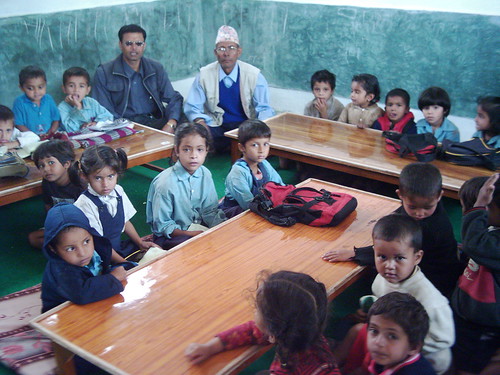Feast of St Andrew, Apostle
(Day 1 of SFX Triduum)
Picture: cc Donnie Ray Jones
My dear friends, are you familiar with the 3 R’s? I’m sure you are, right? Perhaps you’re just wondering which 3 R’s I’m referring to. These days, the common reference is to the 3 R’s of environmental protection. Namely, reduce, reuse, and… recycle. 3 basic actions for helping to save our planet. And then there are also the 3 R’s of primary education. Do you remember what they are? Reading, wRiting, and… aRithmetic. 3 basic skills that every good primary school tries to help its students to master.
But what about the theme that we have chosen for this triduum in preparation for the parish feast of St Francis Xavier? As you know, the focus this year is on being missionary disciples, and the special role of the family in this effort. Which is very appropriate, since Francis Xavier is one of the Church’s two patron saints of the missions. And, just last year, Pope Francis issued a document on the love of the family, entitled Amoris Laetitia. The Joy of Love. Could it be that just as there are 3 R’s in environmental protection, and 3 R’s in primary education, there are also 3 R’s in missionary discipleship? This, my dear friends, is the suggestion that I wish to offer for our reflection over the course of these three evenings.
But first, please allow me to ask you another question. Have you ever come across parents saying something like this to their children? Imagine that it’s almost dinnertime, but the kids are having a snack, because they’re already hungry. So the parents yell at them: Don’t spoil your appetite! Save your stomachs! Now we know, of course, what this means. It’s not that the kids’ stomachs are in any kind of danger. What the parents mean is that the kids should not snack so much that they won’t be able to eat their dinner later. The parents want the children to save space in their stomachs for the food that is yet to come. To save space to receive what is more important. Don’t we need to do this in the spiritual life as well? To save space in our hearts and in our lives to receive and to respond to God’s Word. Receptivity and responsiveness to God’s Call. This is the first R of missionary discipleship. This is what we find in our Mass readings for today.
The first reading tells us that if your lips confess that Jesus is Lord and if you believe in your heart that God raised him from the dead, then you will be saved. Belief in and confession of God’s message is what saves us from sin and selfishness. They give our lives meaning. Allowing us to experience love and joy and peace, even in the midst of stress and suffering and sorrow. Receptivity and responsiveness to God’s Call is central to our faith. And yet, the reading goes on to say that, although the Good News of God’s love and mercy in Christ has gone out through all the earth, not everyone listens to it. Not everyone obeys what they have heard. Not everyone is able to receive the message. It’s as though, like hungry children, who have filled their stomachs with too many snacks, people are simply too full to feast at the Table of the Lord.
Which is perhaps something with which many of us can identify. For aren’t our own lives also filled with many things? Not just many material possessions, over which we may worry and fret. Such as houses and cars, businesses and careers… But also the many activities that cram our busy schedules. Often leaving us little time for ourselves. Time to relax and to get in touch with our deeper desires… Time to connect meaningfully with the people we love and who love us… Time to care for those around us who may need our help… Time simply to allow God to hold us in the warmth of his loving and merciful Embrace… Is it any wonder then, that we may find it difficult to become missionary disciples? For how can we be expected to announce the Good News to others, if we haven’t found the space to receive it for ourselves?
Which is why today’s gospel reading is so valuable. For here we find an impressive image of people who are so remarkably receptive and so generously responsive to God’s Call. There are a few points in the reading that are particularly striking. Notice first how the people whom Jesus calls are all very busy. Simon and Andrew are making a cast in the lake. James and John are mending their nets in their boat. And they are doing all this not as a hobby. They are busy making a living. And yet, when Jesus calls, they leave everything. They leave their nets and their boats. They leave loved ones and colleagues. And, perhaps what’s even more difficult, we may imagine that they leave also their own dreams and ambitions behind.
Another striking thing is that they do this without any hesitation. Even though they don’t know exactly what they are getting themselves into, when Jesus calls, they leave everything and follow him at once. Bible commentators say that the lack of hesitation indicates the great attractiveness of the Lord. Which may be true. But might it not tell us something, not just about the One who calls, but also about those who respond? Doesn’t it show us that, filled though their lives may be, with work and other worries, the brothers have not allowed these more mundane concerns to spoil their appetite for something more important? In the midst of very busy schedules, they have somehow managed to save space in their hearts to receive God’s Call.
Which brings us to another striking characteristic in the gospel story. The fact that families figure so prominently in it. I’m not a scripture scholar, but isn’t it striking how it is two pairs of brothers who receive and respond to God’s Call? And how one of these pairs is described as leaving their father to follow the Lord? The gospel doesn’t say this explicitly. But might we not imagine that the brothers’ ability to respond so readily to Jesus has something to do with how they were brought up in their respective families? Isn’t it possible that they have been taught from young that, beyond the many things that fill their daily lives, they need also to take care to save space for more important things? That beyond busying themselves with catching fish for a living, they need also to be ever prepared to answer the call to gather people into God’s Kingdom. To be true missionary disciples of the Lord.
If this is true, then perhaps what we find in our Mass readings is a call addressed to all of us as well. And to our families. Which very likely come in different shapes and sizes and situations. The invitation is for us to take care to live our family life in such a way that our attention is not completely absorbed by the cares of daily living. That we somehow continue to be mindful to make time and space in our daily routines for the things of God. By praying and reading the Bible together perhaps… By being involved in parish liturgies and other activities wherever possible… By reaching out to those who may need our help… Or by simply trying to find and follow God’s Call in the people and situations we encounter everyday. And teaching our children to do the same.
Receptivity and responsiveness. This is the first R of missionary discipleship. The indispensable first step in imitating St Francis Xavier, and becoming true witnesses and proclaimers of the Good News to the world around us. Receptivity and responsiveness, cultivated in holistic family living.
My dear sisters and brothers, parents often take care to remind their children to save their stomachs for the main meal. What must we do to save space in our hearts and in our families to receive and respond more generously to the Call of Christ today?


